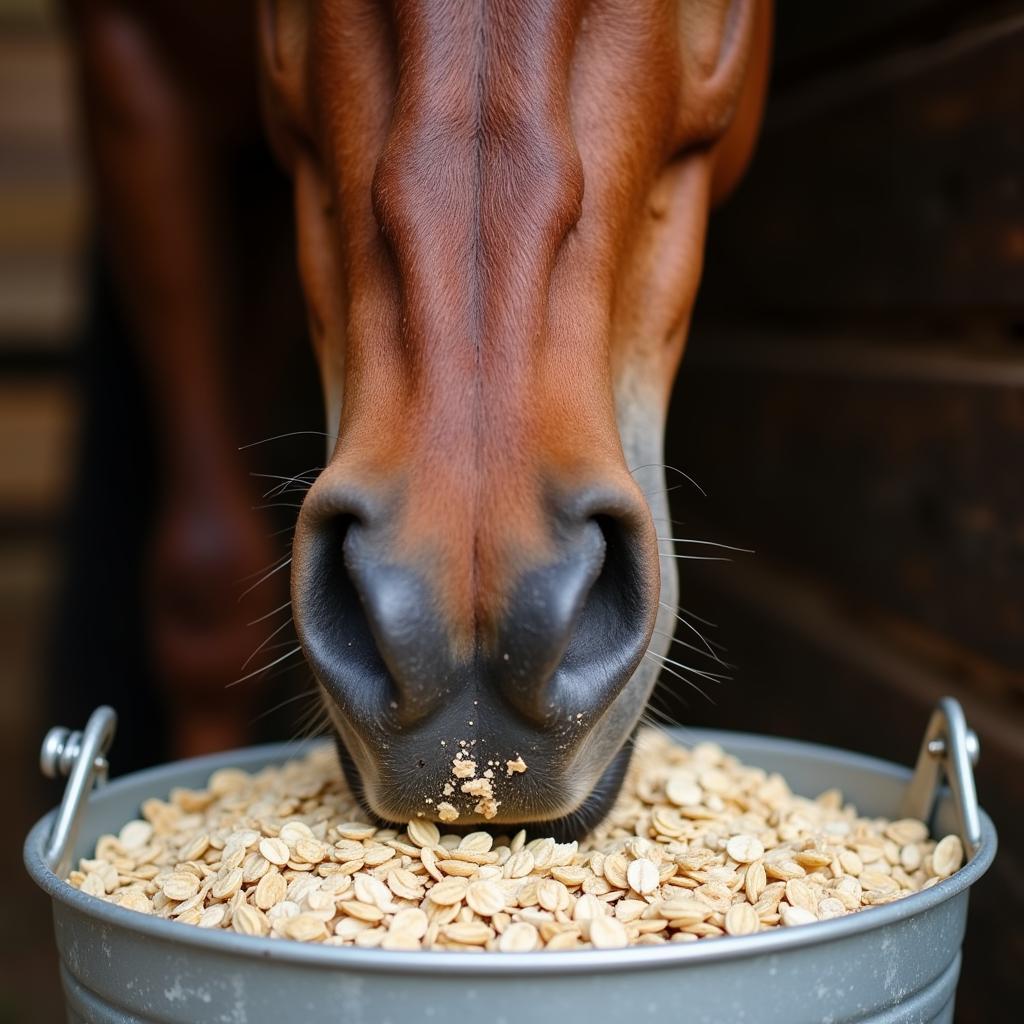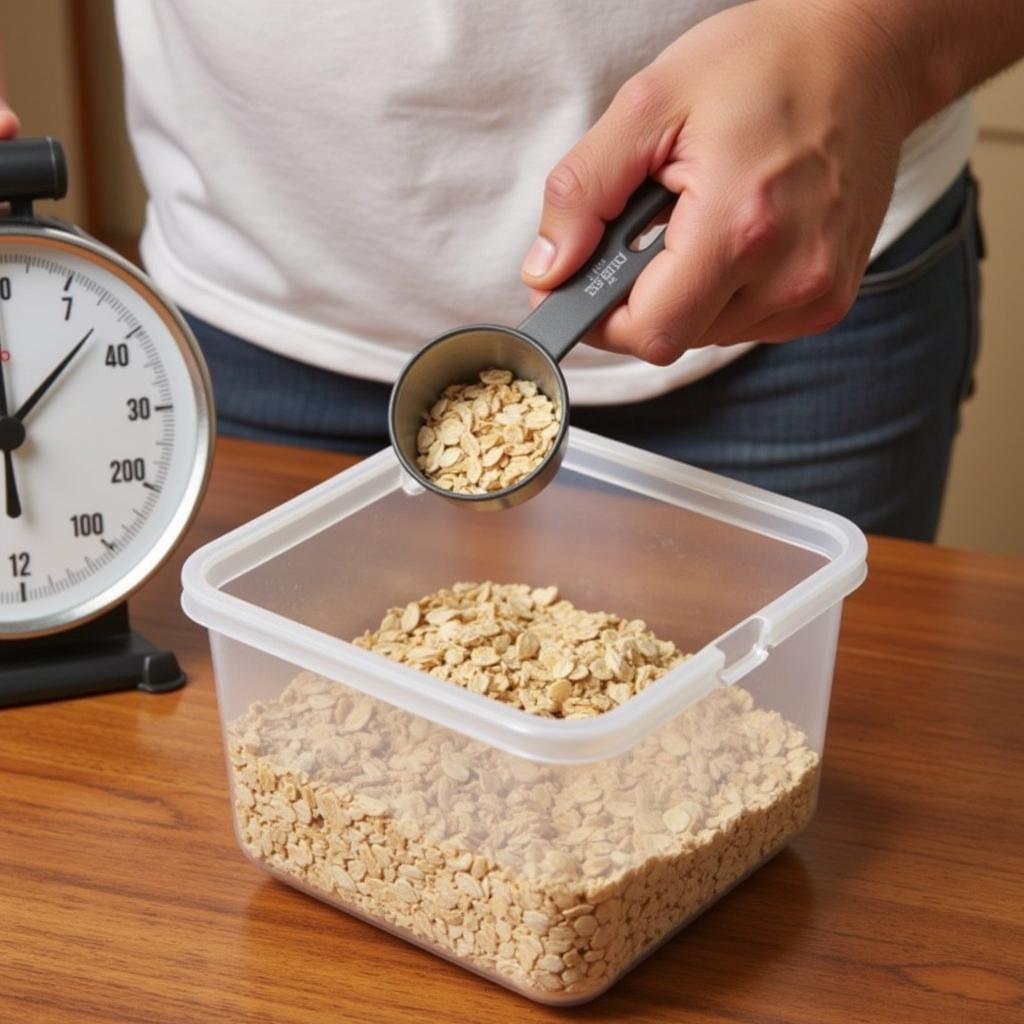Oats are a common feed for horses, but understanding their nutritional value and how to feed them correctly is crucial for your horse’s health. This guide explores the benefits and potential drawbacks of oats for horses, offering practical advice on incorporating them into a balanced diet.
The Nutritional Benefits of Horse Eating Oats
Oats provide a good source of energy for horses, primarily in the form of starch. This energy is essential for maintaining body weight, supporting work performance, and fueling various bodily functions. They are also a decent source of fiber, which is important for digestive health. In addition to energy and fiber, oats contain essential vitamins and minerals, including vitamin B, manganese, and phosphorus, which contribute to overall well-being. However, not all horses react to oats in the same way. Some horses may be more sensitive to the starch in oats, leading to digestive upset or excitability. It’s important to monitor your horse’s individual response to oats and adjust their diet accordingly. You can find more information about what horses can eat in our article about horse birthday cake.
Oats are generally palatable to horses, making them an appealing feed option. Their palatability can be especially beneficial for picky eaters or horses recovering from illness. The fibrous hull of the oat also aids in chewing and saliva production, which contributes to healthy digestion. However, the oat hull can also be a potential source of dust and mold, especially if the oats are not stored properly. Ensuring that oats are clean and free from contaminants is crucial to avoid respiratory issues in horses.
 Horse eating oats from a bucket
Horse eating oats from a bucket
Different Types of Oats for Horses
There are various types of oats available for horses, each with its own characteristics. Whole oats retain the outer hull, offering higher fiber content but requiring more chewing effort. Rolled oats are processed to flatten the grain, making them easier to digest. Crimped oats are another option, where the grain is rolled and crimped, increasing surface area and digestibility. Choosing the right type of oats depends on the individual horse’s needs and digestive capabilities. If you are considering different treats for other animals, you might be interested in our article on can goats have horse treats.
Understanding the difference between these types is crucial for providing optimal nutrition. For horses with dental issues or sensitive digestive systems, rolled or crimped oats are often preferred. Whole oats can be suitable for horses requiring more fiber in their diet.
How to Properly Feed Oats to Your Horse
When feeding oats to your horse, it’s crucial to consider several factors. The amount of oats should be based on the horse’s age, weight, workload, and overall health condition. Overfeeding oats can lead to digestive problems and weight gain. Introducing oats gradually into a horse’s diet is important to allow their digestive system to adapt. Sudden changes in feed can cause colic or other digestive disturbances. Always ensure fresh, clean water is available alongside oats to aid digestion. For those interested in different horse breeds, check out our article on champagne horse for sale.
 Measuring oats for horse feed
Measuring oats for horse feed
“Always introduce new feeds slowly,” advises Dr. Emily Carter, Equine Nutritionist. “This allows the horse’s gut microbiota to adjust, minimizing the risk of digestive upset.”
Potential Drawbacks of Feeding Oats
While oats can be a valuable part of a horse’s diet, some potential drawbacks should be considered. Horses with certain metabolic conditions, such as insulin resistance or Cushing’s disease, may need to limit their intake of starch-rich feeds like oats. The high starch content can exacerbate these conditions and lead to health complications. Oats can also be less cost-effective compared to other feed options, especially if purchased in small quantities. For more information on alternative horse feeds, consider reading our article about can horses have flour.
“Oats can be a great source of energy, but it’s essential to consider the individual horse’s needs,” says John Miller, Certified Farrier. “Some horses simply thrive on a diet lower in starch.”
Conclusion
Horse Eating Oats can be a beneficial part of a balanced equine diet, providing energy, fiber, and essential nutrients. However, it’s crucial to understand the different types of oats, feed them appropriately, and consider potential drawbacks based on your horse’s individual needs. By carefully managing oat intake and monitoring your horse’s response, you can ensure they receive the optimal nutrition for their health and well-being. Learn more about horse coat colors in our article all black horse.
FAQ
- Can I feed oats to my senior horse?
- How much oats should I feed my performance horse?
- Are rolled oats better than whole oats for horses?
- Can oats cause laminitis in horses?
- What are some signs of oat intolerance in horses?
- Can I mix oats with other grains?
- How should I store oats to prevent spoilage?
Need further assistance? Contact us at Phone: 0772127271, Email: [email protected] Or visit us at: QGM2+WX2, Vị Trung, Vị Thuỷ, Hậu Giang, Việt Nam. We have a 24/7 customer support team.